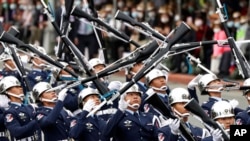ນາຍທະຫານໄຕ້ຫວັນ ທີ່ອອກກິນເບ້ຍບຳນານແລ້ວ 3 ຄົນ ພວມຖືກສືບສວນສອບສວນໃນຂໍ້ຫາຈາລະກຳໃຫ້ພັກຄອມມູນິສຈີນ ແລະໃນນີ້ ມີຜູ້ນຶ່ງຖືກຄຸມຂັງຍ້ອນສົ່ງຄວາມລັບໃຫ້ແກ່ຈີນ.
ພວກນັກຊ່ຽວຊານກ່າວວ່າ ຈີນໄດ້ເພັ່ງເລັງການສືບລັບຂອງຕົນ ໃສ່ພວກນັກທຸລະກິດຫຼືບໍ່ກໍພວກນາຍທະຫານ ທີ່ອອກກິນເບ້ຍບຳນານແລ້ວຂອງໄຕ້ຫວັນ ຊຶ່ງຍັງມີຄວາມສຳພັນທີ່ເຫຼືອຢູ່ໃນໄຕ້ຫວັນແລະມີຜົນປະໂຫຍດໃນຈີນແຜ່ນດິນໃຫຍ່.
ໃນຂະນະທີ່ການສືບສວນສອບສວນກ່ຽວກັບອະດີດພວກນາຍທະຫານດຳເນີນຕໍ່ໄປຢູ່ນີ້ ສະມາຊິກສະພາຂອງໄຕ້ຫວັນກ່າວວ່າ ເຂົາເຈົ້າຫວັງວ່າ ການສືບສວນດັ່ງກ່າວມີຂຶ້ນໂດຍປາສະຈາກການແຊກແຊງທາງດ້ານການເມືອງແລະຈະມີຜົນພາໃຫ້ສາມາດຢັບຢັ້ງໄດ້.
ຫ້ອງການໄອຍະການປະຈຳເຂດຂອງໄຕ້ຫວັນ ກ່າວວ່າ ຄະນະສືບສວນໃນວັນອັງຄານຜ່ານມານີ້ ໄດ້ຄົ້ນເຮືອນຂອງນາຍທະຫານຊັ້ນພັກເອກເບ້ຍບຳນານ 2 ຄົນ ຈາກໜ່ວຍສືບລັບທະຫານ ທ່ານຈັງ ຈາວ ຈານ (Chang Chao-jan) ແລະທ່ານຈູ ຕຽນ ຊູ (Chou Tien-tzu) ແລະອະດີດນາຍພົນຕີ ເຢິ່ນ ຈີ ຈຸ້ງ (Yeun Chih-chung). ພວກເຂົາເຈົ້າ ໄດ້ຖືກກ່າວຫາວ່າ ໄດ້ສະເໜີໃຫ້ພວກເຈົ້າໜ້າທີ່ຄົນອື່ນໆຈາກໜ່ວຍສືບລັບທະຫານ ໃຫ້ແກ່ພວກເຈົ້າໜ້າທີ່ສືບລັບຈີນ ທີ່ອາດເປັນໄປໄດ້ໃນການໃຫ້ຂໍ້ມູນລັບຕ່າງໆ.
ທ່ານຈາງໄດ້ຖືກຈັບ ຫຼັງຈາກສານໄດ້ທຳການສອບຖາມຜູ້ກ່ຽວ. ສ່ວນອີກ 2 ຄົນໄດ້ຖືກປ່ອຍ ດ້ວຍການປະກັນໂຕ 5,200 ໂດລາ.
ໃນການຖະແຫຼງຕໍ່ພວກນັກຂ່າວນັ້ນ ທ່ານຈາງຍັງຢືນຢັດວ່າ ທ່ານບໍ່ມີຄວາມຜິດ ໂດຍກ່າວອ້າງວວ່າ ທ່ານແມ່ນເຈົ້າໜ້າທີ່ສືບລັບຂອງໄຕ້ຫວັນພຽງຜູ້ດຽວເທົ່ານັ້ນທີ່ໄດ້ມີໜ້າ ໃນລະຫວ່າງການສັງຫານໝູ່ທີ່ຈະຕຸລັດທຽນອັນເໝິນ.
ພາຍໃຕ້ກົດໝາຍວ່າດ້ວຍຄວາມໝັ້ນຄົງແຫ່ງຊາດນັ້ນ ນາຍທະຫານສືບລັບທ່ານນີ້ແມ່ນມີຄວາມສ່ຽງທີ່ຈະໄດ້ຮັບໂທດໜັກຈຳຄຸກເປັນເວລາ 7 ປີ.
ໃນເດືອນແລ້ວນີ້ ນາຍທະຫານເບ້ຍບຳນານ ຊັ້ນພັນໂທຂອງໄຕ້ຫວັນອີກຄົນນຶ່ງກໍໄດ້ຖືກຕັດສິນໃຫ້ຈຳຄຸກ 4 ປີ ທີ່ພະຍາຍາມຈະຕັ້ງ ຕາໜ່າງສອດແນມໃຫ້ແກ່ປັກກິ່ງແລະໄດ້ພະຍາຍາມທີ່ຈະເກນເອົານາຍທະຫານຊັ້ນພັນໂທອີກຄົນນຶ່ງໂດຍມອບເງິນແລະຂອງຂວັນໃຫ້ແກ່ຜູ້ກ່ຽວ.
ພວກນັກຊ່ຽວຊານກ່າວວ່າ ໃນໄລຍະຫຼາຍໆປີຜ່ານມານີ້ ຈີນໄດ້ພະຍາຍາມເກນເອົາພວກນັກທຸລະກິດໄຕ້ຫວັນ ຫຼືບໍ່ກໍນາຍທະຫານທີ່ອອກກິນເບ້ຍບຳນານແລ້ວ ອັນເປັນຍຸດທະສາດສ່ວນນຶ່ງແນໃສ່ການຊອກຫາທາງໃຫ້ຮູ້ຈັກກັບບຸກຄົນທີ່ມີເສັ້ນສາຍເປັນທີ່ຮູ້ຈັກ ເພື່ອເຮັດໜ້າທີ່ເປັນຂົວຕໍ່ສຳລັບເປົ້າໝາຍທາງດ້ານສືບລັບ.
Three retired Taiwanese military officers are under investigation over alleged espionage activities for the Chinese Communist Party, with one detained for allegedly passing secrets to China.
Taiwanese legislators said they hoped the inquiry would be conducted without political interference and would have a deterrent effect.
Taiwan’s District Prosecutor’s Office said that investigators on Tuesday searched the home of two retired colonels from the Military Intelligence Bureau, Chang Chao-jan and Chou Tien-tzu, and former Major General Yuen Chih-chung. They are accused of introducing other Military Intelligence Bureau officials to Chinese security agents as potential sources for classified information.
Chang was detained following Wednesday’s court questioning. The other two were freed on bail of $5,200.
Speaking to reporters, Chang maintained his innocence, claiming that he was Taiwan’s only secret agent present in Beijing during the Tiananmen massacre.
Under the National Intelligence Services Act, the retired agents risk a maximum prison term of seven years.
Last month, another retired Taiwanese lieutenant colonel was sentenced to four years for trying to build a spy network for Beijing and for trying to recruit another lieutenant colonel by giving him money and gifts.
Seeking connections
Experts say over the years, China has been actively recruiting Taiwanese businessmen or retired officials as part of a strategy to focus on finding well-connected people who can serve as bridges to an intelligence target.
Peter Mattis, a fellow in the China Program at the Jamestown Foundation, wrote in a report that instead of expending a great deal of effort to identify key people inside Taiwan on its own, Chinese intelligence is putting the onus on its Taiwanese recruits, who already have existing relationships and, perhaps, even some idea of who among their government contacts could be approachable.
“By doing so, Chinese intelligence make their job easier by focusing on Taiwanese inside China over whom they can develop leverage and meet away from the prying eyes of Taiwanese security agencies,” he wrote.
Cheng Yun-peng, a legislator from the Democratic Progressive Party, said if it’s proven that the Chinese Communist Party can effectively conduct espionage in Taiwan, it might affect military and technological cooperation between Taipei and Washington.
“So I hope this investigation can test the effectiveness of our new national security policies. I hope the verdict can have a deterrent effect,” he said.
Closing loopholes
Last year, Taipei passed new laws aimed at tightening national security by closing legal loopholes in the country’s national security policy. The changes affected the Criminal Code, Classified National Security Information Act, National Security Act, and the Act Governing Relations between the People of the Taiwan Area and the Mainland Area.
Yeh Yu-Ian, a legislator from the opposition Kuomintang, said she hoped the trials would be conducted in a fair manner and free from political interference.
In recent weeks, there has been a spate of espionage allegations involving the two sides as tensions grow between Beijing and Taipei.
Chinese state media said in early October that Beijing’s security agents had cracked down on hundreds of spying cases linked to Taiwan and had arrested a batch of alleged Taiwanese spies and their accomplices in its special initiative called “Thunder 2020.”
State CCTV has also aired four confessions by Taiwanese nationals detained by China.
Taiwan's Mainland Affairs Council in Taipei called the report “groundless” and a “malicious political stunt” by the Chinese Communist Party.










